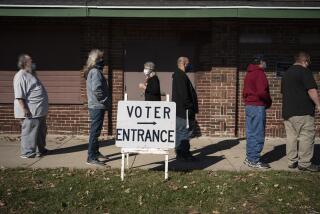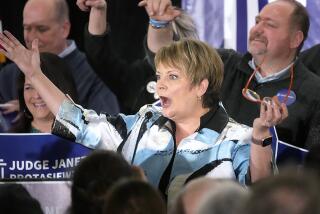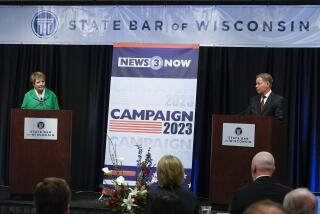Analysis: What Scott Walker’s Wisconsin recall could mean for November
- Share via
Looking for clues about November in today’s Wisconsin recall election? Here are a couple of key numbers that Republican and Democratic party strategists have acutely in mind.
Wisconsin has about 4.3 million voting-age adults. In 2010, Republican Scott Walker won the votes of just over 1.1 million of them to become governor. Two years earlier, Barack Obama won almost 1.7 million votes in carrying the state.
To win reelection, the president almost certainly will have to carry Wisconsin again this fall, but that gap of more than half a million votes between his total in 2008 and Walker’s in 2010 gives him a considerable cushion to start with.
Assuming that Walker wins tonight’s showdown and keeps his job -- a result forecast by most polls and strategists in both parties -- a big question will be whether he has managed to significantly expand the Republican voter base. If he has, then winning Wisconsin a second time will have become much harder for Obama. But if Walker wins without significantly improving on his 2010 vote total, the result probably will say more about the weakness of his opposition than about Obama’s prospects.
The most positive outcome from the White House’s perspective would be for Democratic challenger Tom Barrett to pull off an upset victory. That would come as a massive blow to Republicans, who have spent tens of millions of dollars to defend Walker, and would discourage Mitt Romney’s campaign from seriously contesting Wisconsin this fall.
Upsets, however, are unlikely by definition. No public poll has shown Barrett in the lead, and Democrats’ internal polls also have shown him narrowly trailing. Obama flew over Wisconsin twice on Friday, for stops in Minneapolis and Chicago, without visiting the state -- something he might not have done if White House strategists thought a last-minute visit could turn the tide.
Democratic strategists’ next-best hope is that the outcome will be close -- in the low single digits.
The same polls that show Walker winning also show Obama leading in the state in hypothetical trial heats against Romney. Several factors bolster Obama’s vote in the state -- turnout being the main one.
The Wisconsin Government Accountability Board forecasts a turnout today of between 2.6 million and 2.8 million voters. That strikes some experts as high -- it would be considerably higher than the 2010 election -- but would still be well short of the 3 million who voted in 2008.
In November, black voters can be expected to turn out at a high rate for Obama, as they did in 2008. Young people also are more likely to vote in the fall, when many of them are on easily organized college campuses, than they are in June. A repeated refrain from Democrats has been that a high turnout today would presage a Barrett victory. If that prediction turns out wrong -- if turnout is unusually large and Walker wins anyway -- Democrats will have more to worry about.
Beyond the turnout factor, polls have shown that a small but significant number of Wisconsinites oppose the recall but plan to vote for Obama. Some dislike Walker but disapprove of recalls on principle. Others, however, simply like both men -- as hard as that may be for dedicated partisans on either side to accept.
As we’ve noted before, a driving force behind those swing voters appears to be a sense of economic optimism. It’s no coincidence that Obama and Walker use a virtually identical slogan: “Forward.” Both are arguing to voters that tough economic times have begun to turn and that going “backward” to the “policies of the past” would only make matters worse. Even though the policies they advocate are very different, some small but significant number of swing voters seem to be willing to give both of them the benefit of the doubt.
Whether Obama will still be able to make that argument come November depends a lot on the economic statistics over the next few months. If those continue to sour, Scott Walker’s showing in the recall election will be the least of the president’s problems.
More to Read
Get the L.A. Times Politics newsletter
Deeply reported insights into legislation, politics and policy from Sacramento, Washington and beyond. In your inbox twice per week.
You may occasionally receive promotional content from the Los Angeles Times.











